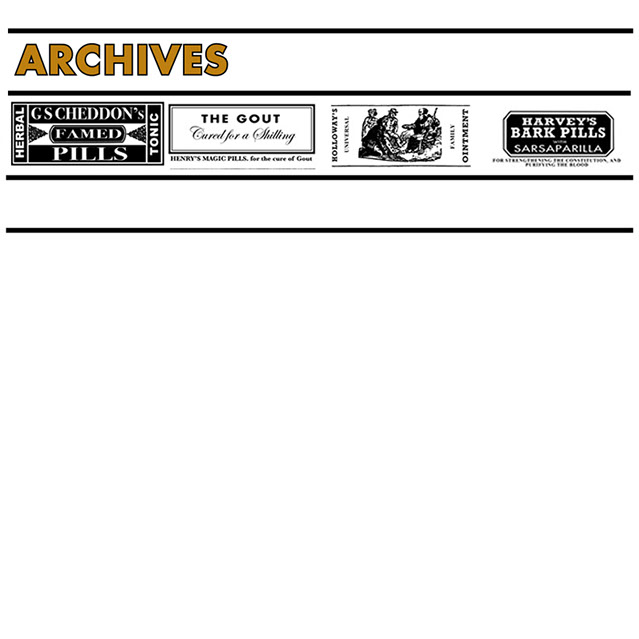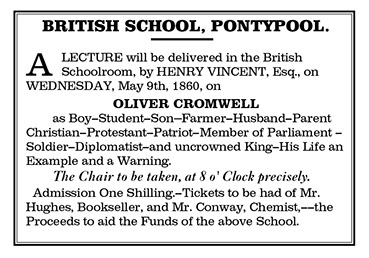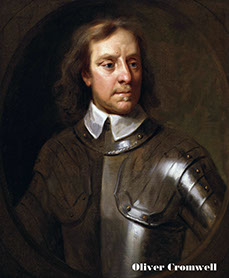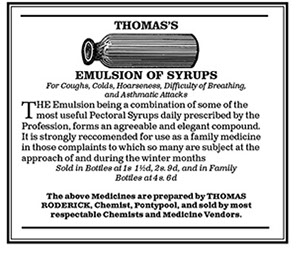






OLIVER CROMWELL
The following article appeared in the Free Press in 1860 after Henry Vincent gave a lecture about Oliver Cromwell at the British School in Pontypool Monmouthshire.
LECTURE BY HENRY VINCENT, ESQ.
 On Wednesday evening, a lecture on Oliver Cromwell,” in aid of the funds of the British School, was delivered at that place by the above popular and distinguished orator. The capacious room was crowded to excess by a highly respectable audience, comprising many of the principal inhabitants of the town and neighbourhood. Dr. Thomas being called upon to preside, said his position must be almost a silent one, for they had come to hear Henry Vincent, Esq., who had done them the favour of once more visiting them, and the greater part of whose life had been devoted to the advancement of education—a labour dear to him and to most of them. Mr. Vincent rose amidst great applause. It afforded him unfeigned satisfaction to once more address a public audience in this town. He would avail himself of the opportunity afforded by the invitation given him, to relate the story of the life of a great man, who rose from the working classes to occupy posts of high honour-who raised the name of this country to an unprecedented pitch of grandeur, and who died peacefully in his bed.
On Wednesday evening, a lecture on Oliver Cromwell,” in aid of the funds of the British School, was delivered at that place by the above popular and distinguished orator. The capacious room was crowded to excess by a highly respectable audience, comprising many of the principal inhabitants of the town and neighbourhood. Dr. Thomas being called upon to preside, said his position must be almost a silent one, for they had come to hear Henry Vincent, Esq., who had done them the favour of once more visiting them, and the greater part of whose life had been devoted to the advancement of education—a labour dear to him and to most of them. Mr. Vincent rose amidst great applause. It afforded him unfeigned satisfaction to once more address a public audience in this town. He would avail himself of the opportunity afforded by the invitation given him, to relate the story of the life of a great man, who rose from the working classes to occupy posts of high honour-who raised the name of this country to an unprecedented pitch of grandeur, and who died peacefully in his bed.
Oliver Cromwell, the hero of this story, was born at St. Ives, Huntingdon, in the month of April, 1599. His father was a reputable country gentleman, with a rent-roll of £4000 per annum. They were descended from the Williams’ of Glamorganshire, and therefore of Welsh extraction and blood—constituting what he considered a perfect mixture. His mother was Elizabeth Stuart, of Ely—and some round- about historians had tried to make out that he was somewhere about 500th’ cousin to royalty. In many histories, Cromwell’s character was covered with obloquy-even school-books spoke of him as an evil soul profaning Holy Writ, a villain with smiling cheek,” &C. By some we are told he was the son of a brewer- which he dare say the brewers would not object to. (No, no ) But we no longer say to a man, “Who was your father ?” We say, What can you do ?”—for the good of society—for the promulgation of Christianity- for the spread of intelligence among all classes? King James, being out on a hawking expedition, had taken shelter from a storm in the house of Oliver’s father, and his mother being well up in the mystery of “egg-hot,”(1) the royal guest made himself merry over his cups; and because a king once got tipsy at his father’s house, they had perhaps called him the son of a brewer. What was the origin of the man ? He was a strong, sturdy boy, thick-set, and had a good nose. A strong man had always a good nose—he did not mean a turn-up nose- (laughter)—he meant no allusion to the noses of any of the audience, for he had never seen a better lot of noses. (Laughter.) Young Oliver had been set up as the perfection of mischief—knew the taste of the apples on every tree for miles around—and was always contriving how to knock over the stalls of the applewomen. But he need not dwell on these things. The boy was conveyed to school at Huntingdon—part of the building was now standing—where a Dr. Beard undertook to flog dog-Latin into him. What progress he made there it was difficult to tell, but this was certain, that he could afterwards discourse in Latin with Milton, and converse in French with the French ambassador. At 17 years of age he was entered as a fellow commoner at Sydney Sussex College, where there is still a large handsome portrait of the Protector.

We were told that while there he was a very profligate young man but it was easier to make charges than to prove them. He remained at college but 14 months, the chain that bound him there being suddenly snapped asunder by the death of his father. He then became the supporter of his widowed mother—and in this height of his prosperity his mother was never absent from his table. Cromwell, at 18 years of age, turns farmer. He was one of those who never thought labour disgraceful. He became learned in manures, went to market, poked pigs in the ribs, and asked the price of wuts” (oats.) At 20, we found him on the Huntingdon coach. Coaches were slow in those days—and there were some” slow coaches” even now—but the coachman was always a very wise man; yet little did he know the freight he was that day driving into London. It was a sweethearting- expedition to the metropolitan box of Sir James Bourchier, who had a handsome daughter. Cromwell talked to ‘Liza, dear,” of the pretty lampkins, &c., and said, I dare say some day we shall go together to Cripplegate church,” and she said, That is what I have just been thinking about;” and when he was but 21 years and 4 months old, they did go to Cripplegate church, and were married. He took his young wife home to his mother, and they were soon blessed with children; but he was not absorbed in his domestic life. The church was split up by a party, like St. George’s- in-the-East.
Cromwell was a puritan churchman whenever he saw blue or green candles on the altar, he didn’t ask some one to blow them out-he blew them out himself. As the quarrel grew, he, with thousands of others, left the church; and he then became familiar with the Independent party—who did not think it wrong to preach in barns. He was not only a Christian, but he felt that to be a Christian he must be a man-that to be a man he must be a patriot. In 1625 he became a candidate for Huntingdon, and was elected. He entered the House in his leather suit. [Mr. Vincent graphically described his uncouth appearance, and its effect upon the “swells.”] The members were discussing the Petition of Rights,” the upshot of which was, that the King dissolved the House, and from the beginning of 1629 to the close of 1639 England had no Parliament. What was the interval ? They had the pillory on Tower Hill and at Charing Cross -the gaols were filled-but there was a spirit in the country which could not be put down. The people were subjected to a forced loan for the King’s use. The tax-gatherer calls. Cromwell says, “I shan’t pay if the King wants money, he must call a Parliament, and what Parliament votes I’ll pay.”
At the close of 1639 Parliament re-assembled, and all the old leaders went back, but it was dissolved in three weeks. Meanwhile, Col, Jones, of this neighbourhood, was arousing the people, and writs were out which produced the Long Parliament. Cromwell was returned for Cambridge. [Mr. Vincent detailed the events of the struggle which followed, and gave a lively description of the yeomanry cavalry man and his charger of that period.] Cromwell, while at Huntingdon, heard that the royal army were about to seize the plate from Cambridge, and immediately getting together his little army, he rushed to Cambridge and seized it himself, then took it up to London and presented it to Parliament, who received it with great satisfaction, and gave him every encouragement to go on in the same line of business. He then went down to St. Albans, at which place the people were divided amongst themselves, not knowing which side to take. Cromwell reached the town-hall just at the time the sheriff, mayor, and other town dignitaries were assembled to hear the reading of the royal proclamation, and the pompous little beadle had but just begun his Oyez” when Cromwell seized both sheriff and mayor, tied them together, put them in a cart, and took them off to London; and then the nasty little shopkeepers could say, Take them all away.” Cromwell gathers together his army, which was not over-well clad, and proceeds to Newark, and being driven back to Grantham obtains reinforcements. He then marched to Horncastle, where he beat the Duke of Newcastle and pursued him, until he shut himself up in York, which Cromwell besieged. Prince Rupert then held a council of war, and they said Let us rout the mob of fanatics and tapsters which comprise the train bands.”
In June, 1644, Rupert broke up his camp. Cromwell, fearing he should be placed between the two fires of the advancing army and the castle, marched to Marston, and made preparations for battle, he having the command of the left wing, which was composed of the “lovely companies”(2) and Ironsides. [Mr. Vincent here gave a vivid and dramatic account of the fearful struggle on Marston Moor, with such effect that it seemed to bring the actual combatants before the eyes of the audience and the war-cry of the Puritans,”The Lord of Hosts is with us !” thrilled through their ears as the Royalists charged the solid square and were driven back—returned to the charge, but again with a like result—while volley after volley was poured into their retreating ranks.] He had no time to follow the career of the dethroned king, as be usually devoted six lectures to the subject. He would merely trace that of Cromwell and the Parliament.
The first difficulties he had to encounter were the Scotch and Irish rebellions. He then traced his progress through the country as commander-in-chief. At Oxford he was offered the post of Lord High Chancellor of the University-he wondered if Dr Pusey ever met his ghost. He arrived in London at the time when the navy had cleared the seas-at the time of Blake’s glorious victories-when the glory of the Commonwealth filled the world. Parliament had become reduced by death, poverty, and (most of all) by timidity. Cromwell wished to dissolve the Long Parliament, which was of 12 years’ standing, but he was opposed, upon which he told them if they did not dissolve, they would soon be all dead. They brought in a bill, one of the clauses of which was that in case of dissolution all the old members should be returned without re-election. They promised him they would not proceed with the bill.
One day a messenger came in great haste to Cromwell at Whitehall, and exclaimed, “The bill, they are proceeding with the bill. Taking with him 300 soldiers he went down to the house—left the soldiers outside, entered alone, and in a long and able speech denounced the passing of the bill. He was asked what right he had to dictate laws to them. After reminding them that he had done something for the country, he gave a signal—the soldiers entered—and he ordered them to clear the house. The members then retreated, the best runners going first. Advancing to the speaker’s table, upon which lay the mace, he ordered them to “Take away that fool’s bauble.” Making sure the house was clear, he locked the door, and put the key in his pocket. He then marched back to Whitehall, and not so much even as a little dog wagged his tail in disapprobation of what he had done. He was Protector five years, and in that time he filled the pulpit with godly men, and the bench with honest judges. His rule was magnificent and moral. He was defender of the faith without the title. [Mr. Vincent here gave an eloquent eulogy on Cromwell’s character and attainments.] He would not say he had no vices, no weaknesses, no failings, but this he would say, that if they had any malignity to spare, there were fitter objects than he upon whom to cast it. It was a warning to despotism that men should rise from the plough tail to defend the civil and religious liberty of a country. It was a warning to all evil doers—it was a warning to the King of Naples—it was a warning to Louis Napoleon—it was a warning to the Pope of Rome-for on their palaces is written Mene, Mene, Tekel, Upharsin.” (3)
(The lecturer sat down amidst immense applause)
The Rev. S. Price then proposed a vote of thanks to Mr. Vincent for his able lecture, which was seconded and carried by acclamation, and the meeting broke up.

Notes.
(1) Egg Hot: Hot ale with eggs, brandy and sugar, frothed
(2) Lovely Companies : Cromwell wrote ‘a lovely company [of]... honest, sober Christians’ (W.C. Abbott (ed.), The Writings and Speeches of Oliver Cromwell (4 vols., Cambridge, Mass., 1937-47), IV, 471._
(3) Mene, Mene, Tekel, Upharsin: “numbered, numbered, weighed, divided” Old Testament. The words that appeared on the wall during Belshazzar’s Feast (Book of Daniel see Wikipedia- the story is the origin of the term "The writing is on the wall" to suggest impending doom




